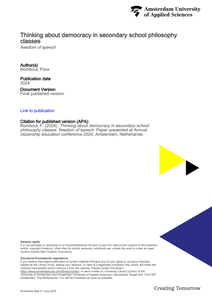Philosophy is an elective subject in secondary education in the Netherlands, which is not often studied in the context of citizenship education. This is probably because only a minority of students participate in philosophy classes in the upper grades of secondary education (approximately 2-5% of all students). However, especially in the years 2022-2025 philosophy is particularly interesting for those studying how citizenship education can be taught, because the higher general track students study a range of philosophical ideas about democracy for their final exams (Spoelstra et al., 2021).This paper presents a qualitative analysis of three philosophy classes about freedom of speech. The lesson transcripts, pre- and post-observation interviews with 3 teachers and 15 students (5 from each class) are coded thematically with a framework for four teacher responsibilities during philosophical discussion in moral education. These four responsibilities are: teachers have an organizational responsibility to facilitate lesson activities such as classroom dialogue to facilitate thinking about democracy, an epistemic responsibility to warrant valid reasoning and recognition of established facts during the lesson, a pedagogic responsibility to create a safe and open classroom climate and a moral responsibility to find the right balance between value communication and stimulation (Leenders & Veugelers, 2004; Rombout et al., 2022; Sprod, 2001). The main research question was: how do philosophy teachers realize these four responsibilities to facilitate their students’ thinking about democracy in a lesson about freedom of speech and how to teacher and students evaluate these responsibilities in this lesson?The findings contain rich descriptions of lesson activities such as considering borderline cases, facilitating teacher-led dialogue, organizing debate, and learning about philosophers’ arguments. These are supplemented with reflections of the participants on teacher neutrality and how open and safe the classroom climate was during these lessons.
DOCUMENT

Postdisciplinarity makes claims on ontological, epistemic, and methodological levels, but it is inevitably a personal philosophical stance. This article represents an existentialist approach to the discourse on postdisciplinarity, offering reflective narratives of three academics. Tomas Pernecky discusses creativity, criticality, freedom, and methodological and epistemic pluralism; Ana María Munar reveals her journey of epistemological awakening; and Brian Wheeller underscores the importance of researchers' subjective and emotive voice. Jointly, the authors depict postdisciplinarity as an invitation to conceptual and interpretive eclecticism, critical analysis, and creative problem solving.
MULTIFILE
Basic human rights, like freedom of expression, freedom of the press, and privacy, are being radically transformed by new technologies. The manifestation of these rights in online spaces is known as “digital rights,” which can be impeded or empowered through the design, governance, and litigation of emerging technologies. Design defines how people encounter the digital world. Some design choices can exploit the right to privacy by commodifying attention through tactics that keep users addicted to maximize profitability; similar design mechanisms and vulnerabilities have facilitated the abuse of journalists and human rights advocates across the globe. But design can also empower human rights, providing novel tools of resistance, accountability, and accessibility, as well as the inclusion of previously underserved voices in the development process. The new capabilities offered by these technologies often transcend political boundaries, presenting complex challenges for meaningful governance and regulation. To address these challenges, collaborations like the Internet Governance Forum and NETmundial have brought together stakeholders from governments, nonprofits, industry, and academia, with efforts to address digital rights like universal internet access. Concurrently, economic forces and international trade negotiations can have substantial impacts on digital rights, with attempts to enforce steeper restrictions on intellectual property. Private actors have also fought to ensure their digital rights through litigation. In Europe, landmark cases have reshaped the international management of data and privacy. In India, indefinite shutdowns of the internet by the government were found to be unconstitutional, establishing online accessibility as a fundamental human right, intimately tied with the right to assembly. And in Africa, litigation has helped ensure freedom of speech and of the press, rights that may affect more individualsas digital technologies continue to shape media. These three spheres—design, diplomacy, and law—illustrate the complexity and ongoing debate to define, protect, and communicate digital rights. Om het artikel te kunnen lezen moet het gekocht worden: https://oxfordre.com/internationalstudies/display/10.1093/acrefore/9780190846626.001.0001/acrefore-9780190846626-e-694?rskey=n09nus&result=4
DOCUMENT